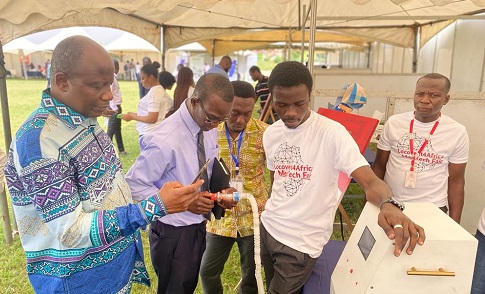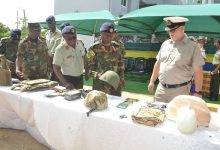
Ghanaian Universities have been urged to move away from the theoretical mode of teaching and adapt to more practical and innovative ways of teaching that will tap into the student’s full potential.
This would ensure that students exhaust their creative capabilities in providing innovative solutions to challenges that occur in the society.
The call was made by the Dean of Mechanical Engineering at the Academic City University College (ACUC), Dr Lucy Agyepong at the ‘Locovent for Africa Medical Technology Fair’ in Accra yesterday.
It was organised by the ACUC in collaboration with the German International Cooperation on the theme “Building Local Capacity in Medical Technology.”
Some of the items on display at the fair were a locally produced ventilator, electronic bicycle, electronic wheelchair and other electronic gadgets.
Using ACUC as an example, she said “recently when we held a SciTech challenge here at academic city college, the things students did with their hands to come up with recyclable products was amazing,” she explained.
Speaking on the ventilator on display, Dr Agyepong said the absence of adequate ventilators in the various public hospitals during the outbreak of the COVID-19 necessitated its creation.
“We set out to design and rapidly produce a low-cost ventilator using locally available and commercially off the shelf materials in Ghana, to assist healthcare professionals in treating patients of the COVID-19 pandemic,” she explained.
She added that post COVID-19, the ventilator would still be essential in health care delivery as it would continue to serve patients with collapsed lungs.
The Minister of Health, Kwaku Agyeman-Manu in a speech read on his behalf by the Head of Biomedical Engineering at the Ministry of Health, Dr Nicholas Adjabu underscored the need for government to invest significantly in the production of medical technologies.
He said the ministry was in the process of developing a medical devices policy that would guide the production and procurement of medical devices to expedite health care delivery.
“The effort in building local capacity to innovation, design and produce medical technology will require policy guidance to make it relevant and fruitful for those who will venture into that industry,” he explained.
Mr Agyeman-Manu noted that the production of the ventilator by the students of ACUC was a clear demonstration of Ghana’s potential of achieving greater heights.
He explained that the outbreak of the pandemic highlighted major challenges in our health sector hence the need to invest in local technology to address some the issues.
“Medical devices have become the backbone of health care service delivery. They are essential component of all clinical procedures performed by our health professionals,” he added.
He promised the ministry’s support for existing and future innovative projects by the ACUC that would increase Ghana’s technological development.
“The Ministry of Health will follow this achievement and where necessary lend its support to this great effort to propel our country into the era of medial devices production,” he said.
The president of Academic City University College, Prof Fred McBagonluri underscored the need for both government and private funding for projects as it would ensure more engineers create innovative technologies.
He explained that the production of the ventilator was proof that Ghanaian engineers were capable of developing technologies that could compete with international brands.
He noted that the ventilator would be affordable for government to procure for the various health facilities in the country saying that “the current market value for a ventilator was between $9,000.00 and $11,000.00 but we can produce it under $2,000.00.
He commended the team of engineering students that developed the ventilator for their relentless effort towards Ghana’s technological development.
BY JESSEL LARTEY THERSON-COFIE







